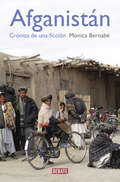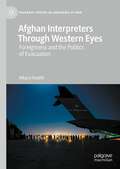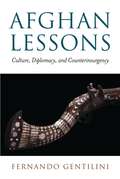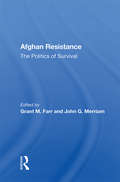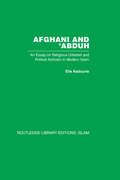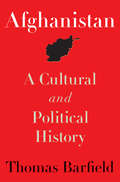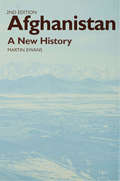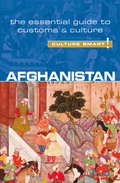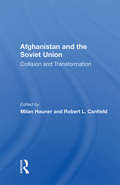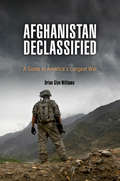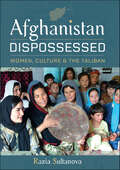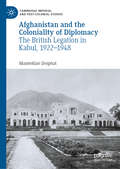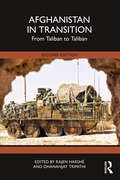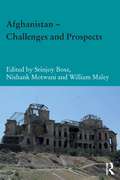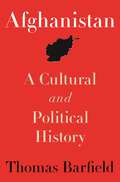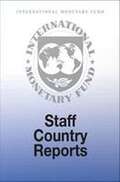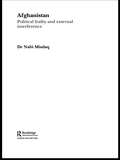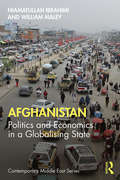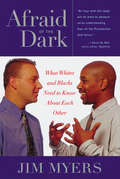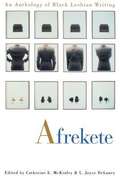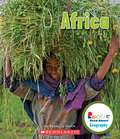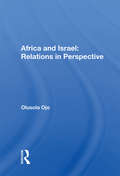- Table View
- List View
Afganistán
by Mónica BernabéEn agosto del año 2000, Mònica Bernabé viajó por primera vez a Afganistán con la intención de conocer de primera mano el régimen talibán. Llegó invitada por una mujer afgana a quien había entrevistado en Barcelona tiempo atrás, la presidenta de una asociación clandestina creada para alfabetizar a mujeres y niñas en un momento en el que la educación era algo prohibido para ellas. El libro narra en orden cronológico los principales acontecimientos ocurridos en este país lleno de contradicciones y tan desconocido para nosotros a lo largo de más de una década: la caída del régimen talibán, las consecuencias del 11S o la presencia de las tropas españolas en Afganistán. Mònica Bernabé nos cuenta la verdadera historia de un país que solo se conoce por los tópicos informativos.
Afghan Interpreters Through Western Eyes: Foreignness and the Politics of Evacuation (Palgrave Studies in Languages at War)
by Hilary FootittThis book explores how endangered local interpreters in Afghanistan were seen through Western eyes in the period from 2014, when the West drew down the bulk of its military forces, to the summer of 2021, when NATO forces withdrew completely. The author examines how these interpreters were understood and represented by Western governments, militaries, agencies, press and lobby organisations, how the understandings changed over time, and to what extent the representations reflect distinct rationales for intervention/historic relationships with Afghanistan, specific immigration and anti-terrorism policies, and notions of citizenship. The book will be of interest to students and scholars of translation and interpreting, history, war studies, and migration studies.
Afghan Lessons
by Angela Arnone Fernando GentiliniFernando Gentilini served nearly two years as the civilian representative of NATO in Afghanistan, running a counterinsurgency campaign in the wartorn nation. Afghan Lessons is the fascinating story of his mission, a firsthand view of Afghanistan through a kaleidoscope. He explores Afghan history, literature, tradition, and culture to understand some of the most basic questions of Western involvement: What is the purpose? What does an international presence mean, and how can it help?Highlights from Afghan Lessons"This is a book about different worlds, different realities. The reality of everyday life in an unreal world. People that need to be looked after, jobs that need to be done, a country that needs to be restored, all from within the necessary confines of an armed camp. And this in the middle of another reality, which we do not understand, full of things forgotten under decades of war. The keys to this reality lie in the past, perhaps lost." --from the Foreword by Robert Cooper"To tempt me to explore their country, the Afghans kept repeating that there were three different Afghanistans: 'The first is the one you Westerners imagine; another coincides with the city of Kabul; the third is the country of remote provinces, far away from the cities, and of the three, this is the only real Afghanistan.'""'There can be no development without security and no security without development.' ... Everyone said it over and over again, both the civilians and the military, but depending on whether it was said by the former or the latter, the emphasis was placed on the first or second part of the slogan. In all honesty this seemingly obvious concept concealed two contrasting ways of seeing things."
Afghan Lessons
by Fernando GentiliniFernando Gentilini served nearly two years as the civilian representative of NATO in Afghanistan, running a counterinsurgency campaign in the wartorn nation. Afghan Lessons is the fascinating story of his mission, a firsthand view of Afghanistan through a kaleidoscope. He explores Afghan history, literature, tradition, and culture to understand some of the most basic questions of Western involvement: What is the purpose? What does an international presence mean, and how can it help?Highlights from Afghan Lessons"This is a book about different worlds, different realities. The reality of everyday life in an unreal world. People that need to be looked after, jobs that need to be done, a country that needs to be restored, all from within the necessary confines of an armed camp. And this in the middle of another reality, which we do not understand, full of things forgotten under decades of war. The keys to this reality lie in the past, perhaps lost." -from the Foreword by Robert Cooper"To tempt me to explore their country, the Afghans kept repeating that there were three different Afghanistans: 'The first is the one you Westerners imagine; another coincides with the city of Kabul; the third is the country of remote provinces, far away from the cities, and of the three, this is the only real Afghanistan.'""'There can be no development without security and no security without development.' ... Everyone said it over and over again, both the civilians and the military, but depending on whether it was said by the former or the latter, the emphasis was placed on the first or second part of the slogan. In all honesty this seemingly obvious concept concealed two contrasting ways of seeing things."
Afghan Resistance: The Politics Of Surivival
by Grant M. Farr John G. MerriamThe people of Afghanistan stand at a crossroads, with resistance to the Soviet occupation entering its eighth year. The question of survival must be weighed against the difficult political choices of fighting or reaching an accommodation with the Soviet-backed Kabul regime. The vast majority choose to continue the struggle--aided in part by covert arms shipments--and to search for a uniquely Afghan nationalism despite rumors of an impending USSR-U.S. deal whereby, in return for Soviet troop withdrawal and cessation of arms aid to the Mujahideen, Afghanistan and Pakistan would become neutral Muslim nations. Drawing on Afghan cultural and historical background, this collection of original essays provides fresh insights into the nature of the Afghan conflict, the country's threatened national infrastructure, the continuing decimation of its citizens, and the prospects for their survival. Showing that popular resistance is not limited to the Mujahideen, or freedom fighters, but encompasses the Afghan people as a whole, the contributors examine the impact of the world's largest refugee population on the shape of the future Afghanistan. Based on their extensive firsthand experience in the region, the contributors provide an interdisciplinary analysis of a country, a people, and a war still too little known to the outside world.
Afghani and 'Abduh: An Essay on Religious Unbelief and Political Activism in Modern Islam
by Elie KedourieFirst published in 2008. Routledge is an imprint of Taylor & Francis, an informa company.
Afghanistan
by Thomas BarfieldAfghanistan traces the historic struggles and the changing nature of political authority in this volatile region of the world, from the Mughal Empire in the sixteenth century to the Taliban resurgence today. Thomas Barfield introduces readers to the bewildering diversity of tribal and ethnic groups in Afghanistan, explaining what unites them as Afghans despite the regional, cultural, and political differences that divide them. He shows how governing these peoples was relatively easy when power was concentrated in a small dynastic elite, but how this delicate political order broke down in the nineteenth and twentieth centuries when Afghanistan's rulers mobilized rural militias to expel first the British and later the Soviets. Armed insurgency proved remarkably successful against the foreign occupiers, but it also undermined the Afghan government's authority and rendered the country ever more difficult to govern as time passed. Barfield vividly describes how Afghanistan's armed factions plunged the country into a civil war, giving rise to clerical rule by the Taliban and Afghanistan's isolation from the world. He examines why the American invasion in the wake of September 11 toppled the Taliban so quickly, and how this easy victory lulled the United States into falsely believing that a viable state could be built just as easily. Afghanistan is essential reading for anyone who wants to understand how a land conquered and ruled by foreign dynasties for more than a thousand years became the "graveyard of empires" for the British and Soviets, and what the United States must do to avoid a similar fate.
Afghanistan - A New History
by Robyn Carr Patrick Weber Martin Ewans Sir Martin EwansSir Martin Ewans, former Head of the British Chancery in Kabul, puts into an historical and contemporary context the series of tragic events that have impinged on Afghanistan in the past fifty years. The book examines the roots of these developments in Afghanistan's earlier history and external relationships, as well as their contemporary relevance
Afghanistan - Culture Smart!
by Moska Najib Nazes AfrozAfghanistan is situated at the crossroads of Asia, a strategically important location that connects the Middle East with Central Asia and the Indian subcontinent. Down the ages it has been subjected to continuous foreign invasion and intervention--from Alexander the Great to Genghis Khan, and as a pawn in the struggle between the British and Russian Empires--making its people wary of outsiders. That history is being repeated in the twenty-first century. Afghanistan has always been seen from the outside as a realm of much intrigue and many myths. The Afghans tried to keep their distance from the outside world--especially from the Europeans who, whether in pursuit of imperial goals or simply as explorer-travelers, attempted to enter and traverse the land. Their very elusiveness attracted Westerners to this landlocked country of high mountains and breathtaking beauty, where age-old customs and traditions were zealously guarded, sometimes at the cost of many lives. The Afghan people are a tapestry of ethnicities woven over time--Pashtuns, Tajiks, Hazaras, Uzbeks, and many smaller ones. Society is organized mainly along ethnic and tribal lines, but ethnic identity becomes irrelevant when a common enemy threatens to take control of the country. There are also many shared values and unwritten codes of conduct that govern interpersonal relations, which are not taken lightly. Visitors are struck by the simplicity, hospitability, dignity, and generosity of the Afghan people, and often confounded by customs that they find hard to understand. Culture Smart! Afghanistan is a unique introduction to the background, habits, traditions, idiosyncrasies, suspicions about foreigners, and patterns of behavior of the Afghan people. It offers visitors invaluable information and insights that will help them to interact with Afghans, to interpret their behavior, and to behave appropriately in their company, whether in personal or business exchanges. Once the ice is broken, the rewards will be great.
Afghanistan And The Soviet Union: Collision And Transformation
by Milan HaunerSince the dramatic events of a decade ago-the revolutions in Kabul and Teheran, the Soviet invasion of Afghanistan, and the Gulf War- "Greater Central Asia" has recaptured the imagination of academia. Historians, Islamicists, anthropologists, political scientists, and defense analysts began to convene conferences and to produce collective volumes that concentrated on two seemingly unrelated subjects: the continuity and strength of ethnocultural patterns in Muslim Central Asia, on the one hand, and the limited range of U.S. military options for defense of the oil-rich Gulf region against hypothetical Soviet invasion, on the other. The contributors to this volume were asked to focus on the long term significance of the junction between Afghanistan and Soviet Eurasia through the "Midlands" region-a relationship that could have wide implications.
Afghanistan Declassified
by Brian Glyn WilliamsNearly 100,000 U.S. soldiers are deployed to Afghanistan, fighting the longest war in the nation's history. But what do Americans know about the land where this conflict is taking place? Many have come to have a grasp of the people, history, and geography of Iraq, but Afghanistan remains a mystery.Originally published by the U.S. Army to provide an overview of the country's terrain, ethnic groups, and history for American troops and now updated and expanded for the general public, Afghanistan Declassified fills in these gaps. Historian Brian Glyn Williams, who has traveled to Afghanistan frequently over the past decade, provides essential background to the war, tracing the rise, fall, and reemergence of the Taliban. Special sections deal with topics such as the CIA's Predator drone campaign in the Pakistani tribal zones, the spread of suicide bombing from Iraq to the Afghan theater of operations, and comparisons between the Soviet and U.S. experiences in Afghanistan.To Williams, a historian of Central Asia, Afghanistan is not merely a theater in the war on terror. It is a primeval, exciting, and beautiful land; not only a place of danger and turmoil but also one of hospitable villagers and stunning landscapes, of great cultural diversity and richness. Williams brings the country to life through his own travel experiences--from living with Northern Alliance Uzbek warlords to working on a major NATO base. National heroes are introduced, Afghanistan's varied ethnic groups are explored, key battles--both ancient and current--are retold, and this land that many see as only a frightening setting for prolonged war emerges in three dimensions.
Afghanistan Dispossessed: Women, Culture & the Taliban
by Razia SultanovaA focused history of women and popular culture in Afghanistan from the Soviet invasion, to 9/11, to the Taliban's takeover.How does normal social, cultural, religious life survive in constant turmoil? How can the people flourish? These basic questions are examined and answered by Razia Sultanova's academic analysis and deep fieldwork, with extensive eyewitness and personal contacts and conversations with a wide variety of Afghan men and women. She looks at basic questions of gender, identity, nation, tradition, history, popular culture and especially the role of music - classical, popular, modern and contemporary - as a vital element for survival. And all is over-shadowed by the Taliban with on-going threat of terror and repression especially for women and girls. Here is a classical story of a people's struggle for everyday normality and preservation of cherished traditions in a war-torn society.
Afghanistan Remembers
by Parin DossaAlthough extensive literature exists on the violence of war, little attention has been given to the ways in which this violence becomes entrenched and normalized in the inner recesses of everyday life. In Afghanistan Remembers, Parin Dossa examines Afghan women's recall of violence through memories and food practices in their homeland and its diaspora. Her work reveals how the suffering and trauma of violence has been rendered socially invisible following decades of life in a war-zone.Dossa argues that it is necessary to acknowledge the impact of violence on the familial lives of Afghan women along with their attempts at recovery under difficult circumstances. Informed by Dossa's own story of family migration and loss, Afghanistan Remembers is a poignant ethnographic account of the trauma of war. She calls on the reader to recognize and bear witness to the impact of deeper forms of violence.
Afghanistan and the Coloniality of Diplomacy: The British Legation in Kabul, 1922–1948 (Cambridge Imperial and Post-Colonial Studies Series)
by Maximilian DrephalThis book offers an institutional history of the British Legation in Kabul, which was established in response to the independence of Afghanistan in 1919. It contextualises this diplomatic mission in the wider remit of Anglo-Afghan relations and diplomacy from the nineteenth to the twenty-first century, examining the networks of family and profession that established the institution’s colonial foundations and its connections across South Asia and the Indian Ocean. The study presents the British Legation as a late imperial institution, which materialised colonialism's governmental practices in the age of independence. Ultimately, it demonstrates the continuation of asymmetries forged in the Anglo-Afghan encounter and shows how these were transformed into instances of diplomatic inequality in the realm of international relations. Approaching diplomacy through the themes of performance, the body and architecture, and in the context of knowledge transfers, this work offers new perspectives on international relations through a cultural history of diplomacy.
Afghanistan in Transition: From Taliban to Taliban
by Rajen Harshé Dhananjay TripathiOwing to its geo-strategic location and mineral wealth, Afghanistan has acquired significance in the inter-state politics of Asia as well as world politics during the past decades. This book discusses the Taliban’s return which outlines the recent and current developments in contemporary Afghanistan. The essays in this volume: Locate Afghanistan under globalisation and reflect on the state and nation-building efforts in Afghanistan by shedding light on the status of citizens, especially women Analyse how the Taliban survived in all these years, and how it returned to power Examine Afghanistan’s relations with major powers like the USA, China, and India and explore the intricacies of ties between India, Pakistan, and Afghanistan within the Indian subcontinent Shedding light on a threshold moment in 21st Century world politics, this work will be useful to scholars and researchers in political science, international relations, sociology, area studies, and the interested general reader.
Afghanistan – Challenges and Prospects: Summary Report (Durham Modern Middle East and Islamic World Series)
by Srinjoy Bose, Nishank Motwani and William MaleyAfter decades of turmoil a new phase is opening up for Afghanistan, in which a new generation comes to the fore as many of the key players from earlier phases, including foreign interventionist powers, leave the scene. Although this new phase offers new possibilities and increased hope for Afghanistan’s future, the huge problems created in earlier phases remain. This book presents a comprehensive overall assessment of the current state of politics and society in Afghanistan, outlining the difficulties and discussing the future possibilities. Many of the contributors are Afghans or Afghan insiders, who are able to put forward a much richer view of the situation than outside foreign observers.
Afghanistan: A Cultural and Political History
by Thomas BarfieldAfghanistan traces the historic struggles and the changing nature of political authority in this volatile region of the world, from the Mughal Empire in the sixteenth century to the Taliban resurgence today. Thomas Barfield introduces readers to the bewildering diversity of tribal and ethnic groups in Afghanistan, explaining what unites them as Afghans despite the regional, cultural, and political differences that divide them. He shows how governing these peoples was relatively easy when power was concentrated in a small dynastic elite, but how this delicate political order broke down in the nineteenth and twentieth centuries when Afghanistan's rulers mobilized rural militias to expel first the British and later the Soviets. Armed insurgency proved remarkably successful against the foreign occupiers, but it also undermined the Afghan government's authority and rendered the country ever more difficult to govern as time passed. Barfield vividly describes how Afghanistan's armed factions plunged the country into a civil war, giving rise to clerical rule by the Taliban and Afghanistan's isolation from the world. He examines why the American invasion in the wake of September 11 toppled the Taliban so quickly, and how this easy victory lulled the United States into falsely believing that a viable state could be built just as easily. Afghanistan is essential reading for anyone who wants to understand how a land conquered and ruled by foreign dynasties for more than a thousand years became the "graveyard of empires" for the British and Soviets, and what the United States must do to avoid a similar fate.
Afghanistan: A Cultural and Political History, Second Edition (Princeton Shorts Ser. #9)
by Thomas BarfieldA major history of Afghanistan and its changing political cultureAfghanistan traces the historic struggles and the changing nature of political authority in this volatile region of the world, from the Mughal Empire in the sixteenth century to the Taliban resurgence today. Thomas Barfield introduces readers to the bewildering diversity of tribal and ethnic groups in Afghanistan, explaining what unites them as Afghans despite the regional, cultural, and political differences that divide them. He shows how governing these peoples was relatively easy when power was concentrated in a small dynastic elite, but how this delicate political order broke down in the nineteenth and twentieth centuries when Afghanistan's rulers mobilized rural militias to expel first the British and later the Soviets. Armed insurgency proved remarkably successful against the foreign occupiers, but it also undermined the Afghan government's authority and rendered the country ever more difficult to govern as time passed. Barfield vividly describes how Afghanistan's armed factions plunged the country into a civil war, giving rise to clerical rule by the Taliban and Afghanistan's isolation from the world. He examines why the American invasion in the wake of September 11 toppled the Taliban so quickly, and how this easy victory lulled the United States into falsely believing that a viable state could be built just as easily.Afghanistan is essential reading for anyone who wants to understand how a land conquered and ruled by foreign dynasties for more than a thousand years became the "graveyard of empires" for the British and Soviets, and why the United States failed to avoid the same fate.
Afghanistan: Political Frailty and External Interference (Routledge Studies in Middle Eastern History)
by Nabi MisdaqAfghan society is analyzed from a fresh standpoint in this book which discusses the country’s two and a half centuries of socio-political disquiet and outside interference. The author explores the continuous struggle between the central government and the cornerstone of the present state, the tribes. In its examination of the interchange between the centre and the periphery, the book presents a compelling review of Afghan history, the role of Islam and the contemporary theories of state, Islam, nationalism, ethnicity, and tribalism. In addition, Misdaq considers Afghanistan’s dynamism and long established custom of dealing with foreign invaders. Covering the Soviet occupation, ethnic conflicts and the US invasion, the book examines Afghan resilience and the capacity to raise an army of fighting men. Written by a well-respected authority on the region, the book highlights past mistakes which should not be repeated and recommends the way forward for this troubled nation.
Afghanistan: Politics and Economics in a Globalising State (The Contemporary Middle East)
by William Maley Niamatullah IbrahimiThis book offers an overview of the formation of the Afghan state and of the politics, economic challenges and international relations of contemporary Afghanistan. It opens with an account of some of the key features that make Afghanistan unique and proceeds to discuss how the Afghan state acquired a distinctive character as a rentier state. In addition, the authors outline a complex range of domestic and external factors that led to the breakdown of the state, and how that breakdown gave rise to a set of challenges with which Afghan political and social actors have been struggling to deal since the 2001 international intervention that overthrew the anti-modernist Taliban regime. It then presents the different types of politics that Afghanistan has witnessed over the last two decades; examines some of the most important features of the Afghan economy; and demonstrates how Afghanistan’s geopolitical location and international relations more broadly have complicated the task of promoting stability in the post-2001 period. It concludes with some reflections on the factors that are likely to shape Afghanistan’s future trajectory and notes that if there are hopes for a better future, they largely rest on the shoulders of a globalised generation of younger Afghans. This book will be of interest to students and scholars in the fields of Middle East and Central Asian studies, international relations, politics, development studies and history.
Afraid of the Dark: What Whites and Blacks Need to Know about Each Other
by Jesse Jackson Jim MyersThe definitive guide for anyone who has contact with people of another race--in companies, schools, neighborhoods, or other social situations--this book asserts that race is not the unfathomable mystery it is usually made out to be. In a revealing, accessible, and stimulating discussion based on little-known facts and innovative research, this book explains why many whites are uneasy about blacks and how blacks react to this, why numerous blacks suspect the worst from whites, why white explanations don't hold up, why myths about sex remain so prevalent, and what both races can do together to make their relations better.
Afrekete: An Anthology of Black Lesbian Writing
by Catherine E. Mckinley Joyce DelaneyDestined to become a classic in the tradition of the best-selling Black-Eyed Susans/Midnight Birds and Erotique Noire/ Black Erotica. Afrekete gives collective voice to the tradition of black lesbian writing. In the vast and proliferating area of both African-American and lesbian and gay writing, the work of black lesbians is most often excluded or relegated to the margins. Afrekete meshes these seemingly disparate traditions and celebrates black lesbian experiences in all their variety and depth. Elegant, timely, provocative, and inspiring, the fiction, poetry, and nonfiction in Afrekete -- written in a range of styles -- engage a variety of highly topical themes, placing them at the center of literary and social discourse. Beginning with "Tar Beach," an excerpt from Audre Lorde's celebrated memoir Zami: A New Spelling of My Name, which introduces the character Afrekete, the collection also includes such prominent writers as Michelle Cliff, Carolivia Herron, Jewelle Gomez, and Alexis De Veaux. Other pieces are by Jacqueline Woodson, Sapphire, Essence editor Linda Villarosa, and filmmaker Michelle Parkerson, with other contributions by exciting new writers Cynthia Bond, Jocelyn Taylor, Jamika Ajalon, and Sharee Nash. Afrekete is a collection whose time has come. It is an extraordinary work, one of lasting value for all lovers of literature. A fresh, engaging journey, Afrekete will both inform and delight.
Africa (Rookie Read-About Geography)
by Rebecca E. Hirsch<p>Get ready for a fascinating trip around the seven continents of the world! Simple, engaging text and colorful, mesmerizing pictures teach you about each continent's land features, populations, native animals, technological advances, and lots more—including how to find each continent on a map! <p>Africa is a large and diverse continent, and young readers will love discovering the people, geography, and animals found there.</p>
Africa And Israel: Relations In Perspective
by Olusola OjoThis book examines Afro-Israeli relations from about 1958, when Israel launched its diplomatic initiative in Africa, to 1973, when most African states severed their diplomatic ties. It investigates post-1973 ties and provides case studies on Israel's relations with South Africa and Nigeria.
